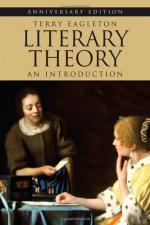
|
| Name: _________________________ | Period: ___________________ |
This test consists of 5 multiple choice questions, 5 short answer questions, and 10 short essay questions.
Multiple Choice Questions
1. How did the Romantic artist reflect her or his work in its detachment from history itself?
(a) Because she or he was seen as a consumer of commodities who bought their goods for low pay.
(b) Because she or he was seen as a minor commodity who existed on the margins of society.
(c) Because she or he was seen as a major commodity who existed within society.
(d) Because she or he was seen as a producer of commodities who sold their goods for high pay.
2. What proposes a "severe problem" for Husserl's theory?
(a) Individuality.
(b) Truth.
(c) Consciousness.
(d) Language.
3. According to Eagleton, as the first industrialist capitalist nation, England becomes what kind of state?
(a) A perfect state.
(b) A wealthy state.
(c) A free state.
(d) A police state.
4. According to Eagleton, Gibbon and the authors of Genesis share what in common?
(a) Both wrote fiction that is read as historical fact.
(b) Both wrote fiction that is read as fact by some and fiction by others.
(c) They both thought they were writing historical truth, but are read as fact by some and fiction by others.
(d) Both wrote historical truth that is read as fiction.
5. According to Eagleton, "Literary Theory: An Introduction" has managed to reach readers beyond __________.
(a) Literature.
(b) Students.
(c) Academia.
(d) Historians.
Short Answer Questions
1. According to Eagleton, what kind of age do we live in, where "meaning, like everything else, is expected to be instantly consumable"?
2. According to the Russian critic Roman Jakobson, literature represents "organized ______committed on ordinary _______."
3. The German philosopher Edmund Husserl argued that objects can be regarded as things ______ by consciousness.
4. How far has the "theoretical revolution" spread according to Eagleton?
5. For Eagleton, how did the romantics usher a "forestalling of reasoned critical enquiry"?
Short Essay Questions
1. How did the romantic movement develop and why is it significant?
2. In the late-sixteenth and early-seventeenth centuries, what was considered "fact" and what was considered "fiction," and how is it significant?
3. What were the Russian formalists responding to in terms of literary criticism?
4. What was the dominant ideology of eighteenth-century England?
5. What kind of thought does a literary education not encourage, according to Eagleton, and what does this signify?
6. What does "concretize" mean and why is it significant?
7. What is Eagleton's argument regarding the literary canon as the "unquestioned" great tradition of national literature?
8. What did the critic E.D. Hirsch, Jr. believe about the reader's relationship to a text?
9. What was the romantics relationship to the symbol and why is it significant?
10. Why is literature an unstable term, according to Eagleton?
|
This section contains 826 words (approx. 3 pages at 300 words per page) |

|




